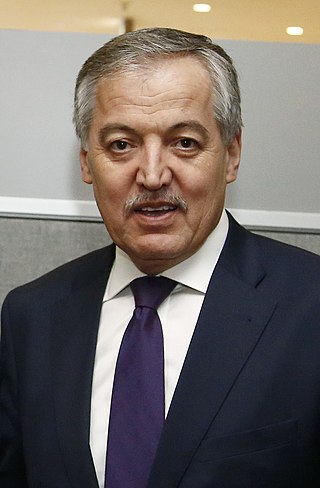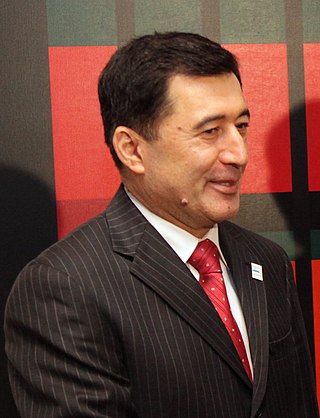Related Research Articles

Kazakhstan's approach to foreign relations is multifaceted and strategic,reflecting the country's unique geopolitical position,historical context,and economic ambitions. At the heart of its international diplomacy is a multivector foreign policy,which aims to maintain balanced and diverse relations with all major global powers and regional neighbours. Kazakhstan is a member of the United Nations,Collective Security Treaty Organization,Organization for Security and Co-operation in Europe,North Atlantic Cooperation Council,Commonwealth of Independent States,the Shanghai Cooperation Organisation,and NATO's Partnership for Peace program. Kazakhstan established a customs union with Russia and Belarus which eventually became the Eurasian Economic Union. President Nazarbayev has prioritized economic diplomacy into Kazakhstan's foreign policy.

Foreign relations of Tajikistan are based on a desire to secure foreign investment and promote regional security while ensuring Tajikistan's independence. Sirodjidin Aslov is the current Foreign’s Minister of Tajikistan.

Uzbekistan joined the Commonwealth of Independent States in December 1991. However,it is opposed to reintegration and withdrew from the CIS collective security arrangement in 1999. Since that time,Uzbekistan has participated in the CIS peacekeeping force in Tajikistan and in United Nations-organized groups to help solve the Tajik and Afghan conflicts,both of which it sees as posing threats to its own stability. Uzbekistan is an active supporter of U.S. efforts against worldwide terrorism and joined the coalitions which have dealt with both Afghanistan and Iraq. It is a member of the United Nations,the Euro-Atlantic Partnership Council,Partnership for Peace,and the Organization for Security and Cooperation in Europe (OSCE). It belongs to the Organisation of Islamic Cooperation (OIC) and the Economic Cooperation Organization,which comprises 7 Central Asian countries:Pakistan,Uzbekistan,Kazakhstan,Turkmenistan,Afghanistan,Kyrgyzstan and Tajikistan. It is a founding member of and remains involved in the Central Asian Union,formed with Kazakhstan and Kyrgyzstan,joined in March 1998 by Tajikistan.

The Shanghai Cooperation Organisation (SCO) is a Eurasian political,economic,international security and defence organization established by China and Russia in 2001. It is the world's largest regional organization in terms of geographic scope and population,covering approximately 24% of the area of world and 42% of the world population. As of 2024,its combined nominal GDP accounts for around 23%,while its GDP based on PPP comprises approximately 36% of the world's total.

The Economic Cooperation Organization or ECO is a Eurasian political and economic intergovernmental organization that was founded in 1985 in Tehran by the leaders of Iran,Pakistan,and Turkey. It provides a platform to discuss ways to improve development and promote trade and investment opportunities. The ECO is an ad hoc organisation under the United Nations Charter. The objective is to establish a single market for goods and services,much like the European Union. After the dissolution of the Soviet Union,the ECO expanded to include Afghanistan,Azerbaijan,Kazakhstan,Kyrgyzstan,Tajikistan,Turkmenistan,and Uzbekistan in 1992.

The Tajikistani Civil War,also known as the Tajik Civil War,began in May 1992 and ended in June 1997. Regional groups from the Garm and Gorno-Badakhshan regions of Tajikistan rose up against the newly formed government of President Rahmon Nabiyev,which was dominated by people from the Khujand and Kulob regions. The rebel groups were led by a combination of liberal democratic reformers and Islamists,who would later organize under the banner of the United Tajik Opposition. The government was supported by Russian military and border guards.

Sirojiddin Muhriddin (Tajik:СироҷиддинМуҳриддин;born Sirojiddin Muhriddinovich Aslov is the Minister of Foreign Affairs of Tajikistan since 2013. Muhriddin previously worked as a Permanent Representative of the Republic of Tajikistan to the United Nations from 2006 to 2013.

Pan Guang is the Director of and Professor at the Shanghai Center for International Studies and Institute of European &Asian Studies at the Shanghai Academy of Social Sciences,Director of SCO Studies Center in Shanghai,Dean of Center of Jewish Studies Shanghai (CJSS),and Vice Chairman of the Chinese Society of Middle East Studies.

Vladimir Imamovich Norov is the former minister of foreign affairs of Uzbekistan and a former secretary-general of the Shanghai Cooperation Organisation (2019–2021).
Bolat Kabdylkhamituly Nurgaliyev is a Kazakh diplomat and the current Special Representative of the OSCE Chairperson-in-Office for protracted conflicts.

Andrej Benedejčič is a Slovenian diplomat,currently serving as the Permanent Representative of the Republic of Slovenia to the Organization for Security and Co-operation in Europe and other International Organizations in Vienna.

Russia–Tajikistan relations are the bilateral relations between the Russian Federation and Tajikistan.

Pakistan formally consummated diplomatic ties with Kyrgyzstan on May 10,1992,although relations were initially founded on December 20,1991,shortly after Kyrgyzstan became independent of the Soviet Union. Consequently,Pakistan opened its diplomatic outpost in Bishkek in 1995.
Ayni Air Force Base,also known as Gissar Air Base,is a military air base in Tajikistan,10 km (6.2 mi) west of the capital Dushanbe. The base is jointly operated by the Indian Air Force and the Tajik Air Force. It is India's second overseas air base after Farkhor Air Base. Since 2014 India has deployed Su-30MKI in limited numbers at this base. The base was extensively used by Indian Air Force as a standby base for its aircraft to evacuate Indian Nationals from Kabul Airport amidst the Afghan Crisis.
Ambassador Ersin Erçin is a senior Turkish diplomat,with an extensive experience in multilateral diplomacy particularly on matters of international,Euro-Atlantic and Eurasian security,disarmament,and economic and environmental security.
The 2014 SCO summit was the 13th annual summit of heads of state of the Shanghai Cooperation Organisation held between 11 and 12 September in Dushanbe,Tajikistan. Security was among the top issues for 13th annual summit and all members during the last meeting reached a consensus on fighting against separatism,extremism and terrorism,as well as on safeguarding regional peace and security therefore Afghanistan will be focal point during talks in Dushanbe,claim some diplomats of member countries.

The Ministry of Foreign Affairs of Tajikistan is a government ministry of Tajikistan. It is the central executive authority exercising state administration in the sphere of relations of the Republic of Tajikistan with foreign countries and international organizations. It carries out its activities in cooperation with other central executive bodies,local government bodies,legal entities. The Ministry of Foreign Affairs of the Republic of Tajikistan has the status of a legal entity,its own seal,stamps,and bank accounts. The current Minister is Sirojiddin Muhriddin.

A series of sporadic border clashes resumed between Kyrgyzstan and Tajikistan on 27 January 2022,following a series of clashes in 2021 between the two countries.
References
- ↑ Bashiri, Iraj (2002). Prominent Tajik Figures of the Twentieth Century . p. 229.
- 1 2 "Rashid Alimov: The SCO is now "G8"". Shanghai Cooperation Organisation. 15 June 2017. Retrieved July 18, 2020.
- 1 2 3 4 Kamoludin Abdullaev; Shahram Akbarzaheh (April 27, 2010). Historical Dictionary of Tajikistan. Scarecrow Press. p. 59. ISBN 978-0810873797.
- ↑ "Rashid Alimov Author". United Nations. Archived from the original on 29 July 2020. Retrieved 29 July 2020.
- ↑ "New book by SCO secretary general presented in SCO headquarters". Asia Plus. 27 December 2018. Retrieved 18 July 2020.